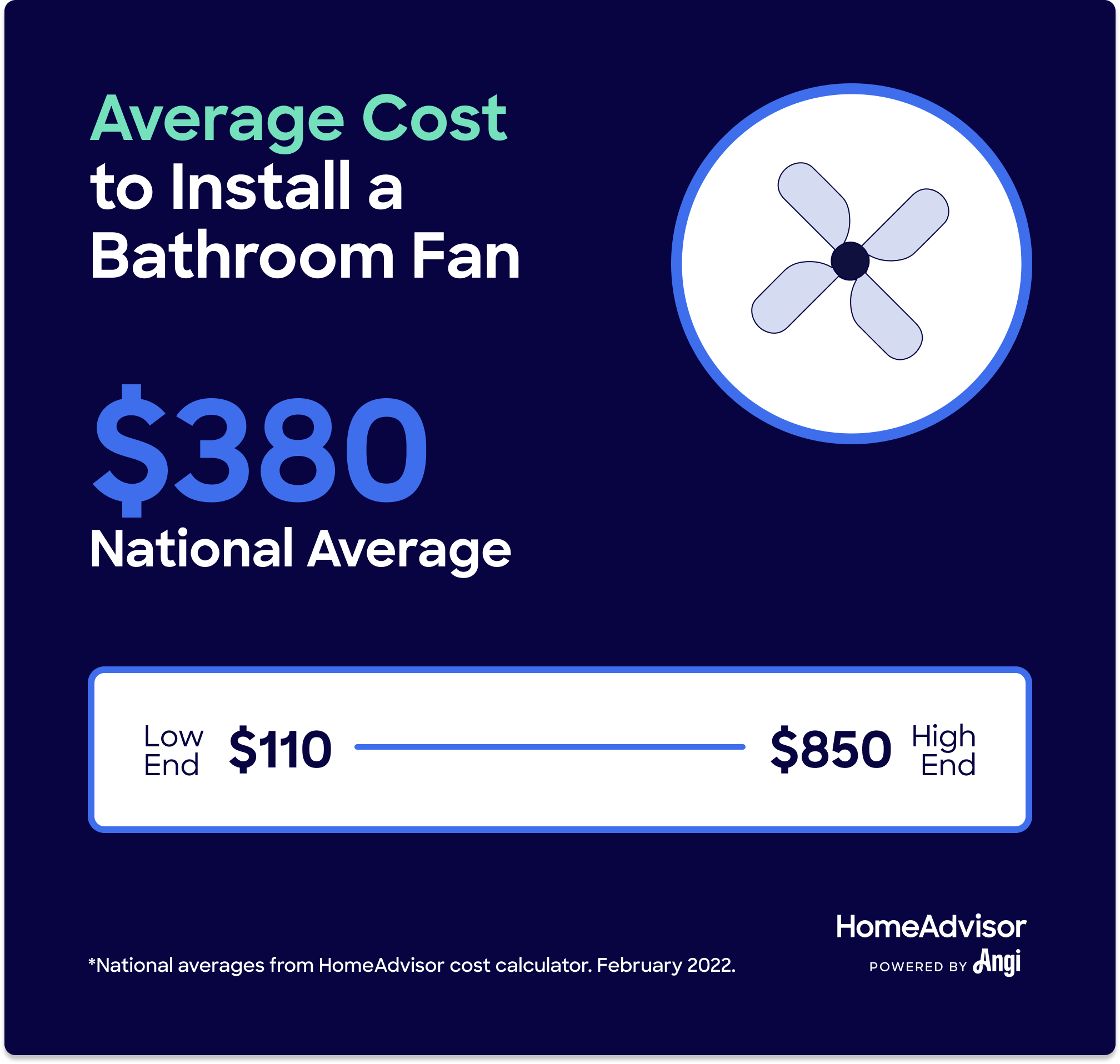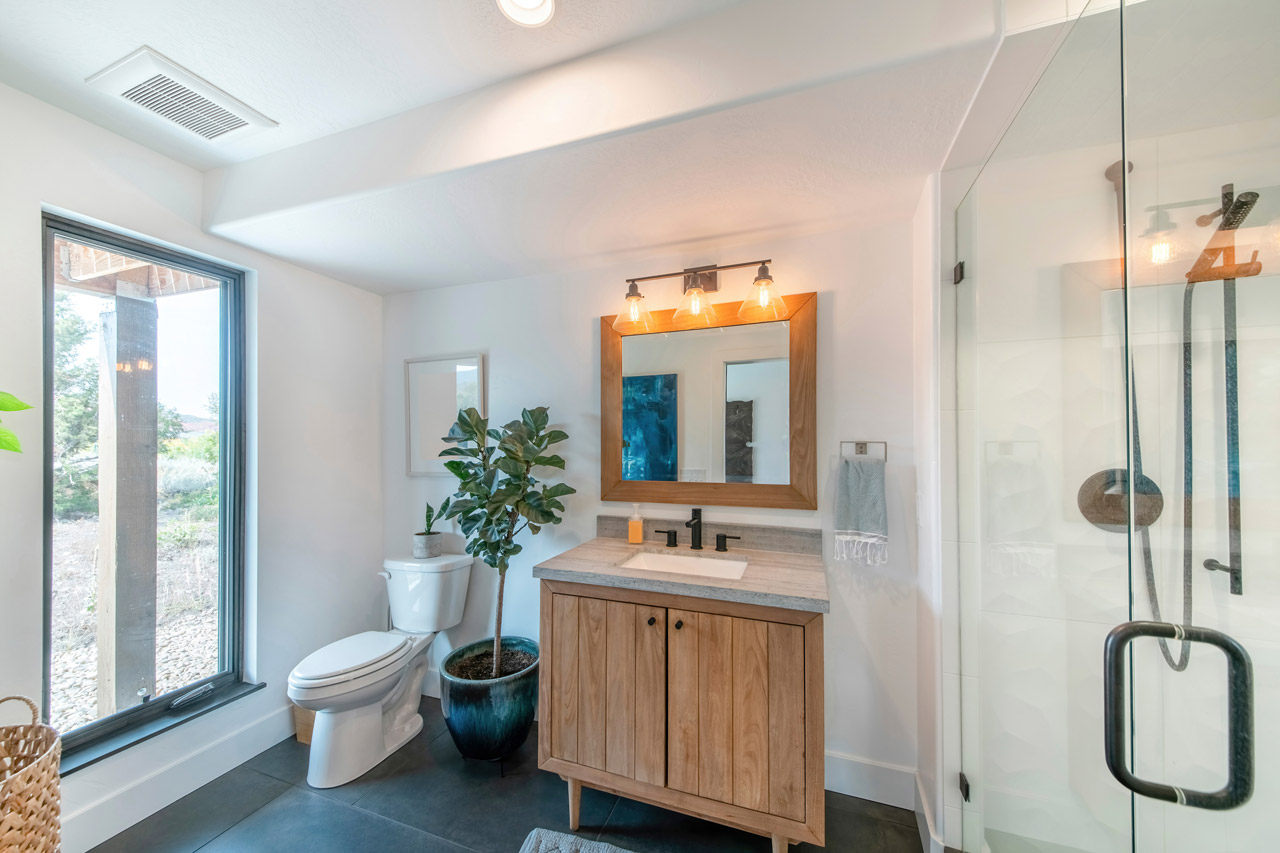How Much Does A Bathroom Fan Installation Cost?
Typical Range:
$240 - $564
Typical Range:
$240 - $564
Cost data is based on actual project costs as reported by 2,454 HomeAdvisor members. Embed this data
.
.
.
.
.
.
.
.
.
.
.
.
.
.
.
.
.
.
.
.
.
.
.
.
.
.
.
.
.
.
•
•
•
•
Updated July 19, 2022
Written by HomeAdvisor.Exhaust fans remove moisture and steam from your bathroom, which in turn protects your bathroom paint job from damage and helps prevent the accumulation of mildew and mold. Exhaust fans also remove odors from bathrooms. The price to install a bathroom fan can range between $240 and $564, with an average cost of $395. Some major cost factors in installing a bathroom fan include labor costs, geographic location, and your bathroom size.
Let's calculate cost data for you. Where are you located?
Where are you located?
| National Average | $395 |
| Typical Range | $240 - $564 |
| Low End - High End | $115 - $900 |
Cost data is based on actual project costs as reported by 2,454 HomeAdvisor members.
The average bathroom fan price varies from $20 to $500, depending on the unit’s CFM (cubic feet per minute), which measures the fan’s ability to move air. An exhaust fan that creates between 40 and 79 CFMs may cost $20 to $250, while a fan rated at 150 to 200 CFMs can range from $100 to $500.
| Bathroom Size (Sq. Ft.) | CFMs Required | Average Price Range for Unit |
|---|---|---|
| 40 – 79 | 40 – 79 | $20 – $250 |
| 80 – 99 | 80 – 99 | $50 – $325 |
| 100 – 149 | 100 – 200 | $55 – $400 |
| 150+ | 150 – 200 | $100 – $500 |
As the table above shows, the square footage of your bathroom will dictate the number of CFMs your bathroom fan will require, generally at a 1:1 ratio. That is, a fan needs at least 1 CFM per 1 square foot. However, it’s a good idea to aim for more CFMs than square feet for satisfactory operation. The larger the bathroom, the more CFMs a fan will need.
If your bathroom is over 100 square feet, you should instead calculate CFMs by the number and type of fixture:
Bathtub: 50 CFMs
Shower: 50 CFMs
Toilet: 50 CFMs
Jetted tub: 100 CFMs
For example, a bathroom with a stand-up shower, toilet, and jetted tub would need a fan with at least a 200 CFM rating, while a bathroom that’s more than 100 square feet with only a standard bathtub and toilet would need a fan with at least a 100 CFMrating.
Note: If a toilet is separated from the rest of the bathroom by a door, it’s a good idea to install a separate exhaust fan above the toilet; 50 CFM should suffice.
The price of a new bathroom exhaust fan can range from $20 to $500 for a ceiling insert, $30 to $240 for a wall insert, and $100 to $300 for an inline fan.
If you’re replacing an existing fan of the same type, your overall bathroom vent installation cost will be lower because there shouldn’t be any drywall work, major rewiring, or new ductwork necessary.
When designing a new bathroom, you can choose the type of exhaust fan you prefer without additional cost implications.
| Type of Bathroom Fan | Average Price Range for Fan |
|---|---|
| Ceiling insert | $20 – $500 |
| Wall insert | $30 – $240 |
| Inline | $100 – $300 |
A ceiling-mounted bathroom fan costs around $20 to $500. Because hot, steamy air rises, a ceiling insert fan is an efficient choice for removing air from most bathrooms. These models suck moist air into ductwork that vents to the outside, either through the roof or a wall.
You can also redirect air and moisture outside with a roof vent. Ridge roof vents cost around $2 to $3 per linear foot. With labor, venting through your bathroom wall costs around $300 to $650.
Expect to pay between $30 and $240 for a new wall-mounted bathroom exhaust fan. Wall insert exhaust fans are sometimes ideal because they usually work on an outside wall, and the air is released outside without relying on ducts for ventilation. A wall-mounted exhaust fan is often an efficient solution if a roof ventilation path isn't available.
The average price of residential inline bathroom fans ranges from $100 to $300. These fans sit deeper within the ductwork of your house. Sometimes, a single inline fan can ventilate multiple bathrooms at once. They may also be quieter in operation but require more time and skill to install.
Several additional factors can affect your overall bathroom fan installation cost, including the type of fan you choose, labor costs (and the type of labor required), whether it’s a new fan or replacement, and the fan’s sones rating, which we cover in more detail below.
A basic bathroom fan can cost as little as $20, but special features like Bluetooth ($100 to $300) and motion sensing ($100 to $400) can significantly raise the price.
| Fan Feature | Average Price Range for Fan Unit |
|---|---|
| Basic | $20 – $80 |
| Light | $40 – $400 |
| Heater | $100 – $300 |
| Bluetooth | $100 – $300 |
| Timer | $100 – $300 |
| Humidity sensing | $100 – $400 |
| Adjustable speed | $100 – $400 |
| Light and heater | $100 – $425 |
In most cases, either an experienced handyperson or a licensed electrician will be the best choice to install your bathroom fan. The cost to hire an electrician is typically between $50 and $100 per hour. If you need new ductwork, a local HVAC specialist can get the job done.
With basic electrical and ductwork, installation can take anywhere from four to six hours, meaning the average labor costs to install an exhaust fan are around $200 to $600.
Replacing an existing fan means using existing wiring and ducts for ventilation. The cost to replace a bathroom fan is $250 on average. If you're installing a fan in a bathroom for the first time, an electrician must provide new wiring.
When installing a bathroom fan where one doesn't currently exist, an electrician will have to cut a hole for it and add new wiring. On average, this will take two to four hours, but it could take longer depending on your home's structure.
Duct installation costs between $450 and $2,050, based on the location, home size, and how much time installation will take. In bigger homes, ductwork might cost upwards of $4,500.
Ductwork isn't necessary for every bathroom fan installation. Wall-mounted fans don't require ductwork, and even if you're installing a ceiling insert exhaust fan, most bathrooms already have a vent access through the roof, a wall, or both. However, you'll need to install ductwork if there's no vent access.
Sones are a measure of the fan’s noise level. The lower the sone, the quieter (but more expensive) the fan, from as little as $20 for 4 sones to as much as $500 for 0.5 sones or fewer. If you want a moderately quiet fan, a rating of 2 sones or fewer is a safe bet.
| Sones | Average Price Range for Fan Unit |
|---|---|
| 0.5 or fewer | $100 – $500 |
| 1 | $75 – $450 |
| 2 | $40 – $300 |
| 3 | $30 – $200 |
| 4 | $20 – $100 |
The cost of installing or replacing an exhaust fan in one of your home’s bathrooms can vary depending on your location. In most cases, price variation comes down to differences in hourly labor costs. Ask for estimates from at least three pros to compare pricing for the installation.
| Atlanta | $250 – $580 |
| Boston | $250 – $580 |
| Chicago | $200 – $550 |
| Dallas | $150 – $450 |
| Denver | $250 – $530 |
| Los Angeles | $250 – $550 |
| New York City | $250 – $900 |
Installing a bathroom fan is a moderately challenging project. If you aren't comfortable working with electrical wiring or need to install ductwork, the project is best left to a pro. Find a few electricians near you and compare their quotes; they can also likely advise on product choices (including the ideal CFM) and whether ductwork will be necessary.
The cost to install a bathroom exhaust fan yourself ranges from $180 to $1,450 but could be much lower if you already have some of the tools required or don't need to install new vents. If you don't already own any of the tools listed below or don't already have the necessary infrastructure in place, the cost may be the same as—or more than—if you'd paid a professional contractor.
For most, it makes sense to work with a local bathroom remodeler on exhaust fan installation, especially if you lump it in with a larger overall bathroom remodel cost. However, if you're looking to keep your overall installation costs down, you can attempt to do this project yourself with the following materials and tools:
| Material/Tool | Average Cost* |
|---|---|
| Fan | $20 – $500 |
| Ducts | $0 – $25 |
| Ladder | $100 |
| Drywall saw | $0 – $15 |
| Reciprocating saw | $0 – $150 |
| Power drill | $50 – $250 |
| Roofing adhesive | $0 – $50 |
| Roof vent | $0 – $350 |
| Roofing nails | $5 |
*Some tools/materials aren’t needed for certain types of fans (or if replacing a fan), hence the $0 estimate for the lower end of the price range. If you already own any of these tools and materials, remove them from your cost calculations.
While plumbers and experienced repair pros may be able to install a replacement bathroom exhaust fan, in most cases, you should hire a licensed electrician to handle any wiring. However, if you need new ductwork, you’ll also need to call an HVAC specialist.
If you’re replacing an existing fan, purchase a fan with the same dimensions so you won’t have to make any additional cuts in your ceiling or wall to accommodate it.
Pay attention to the fan’s CFM (cubic feet per minute) rating. A larger bathroom generally benefits from a larger CFM rating. At a minimum, you need 1 CFM per 1 square foot. However, it’s a good idea for the CFM to be larger than the square footage.
You may also want to look for a disclosure on the fan’s packaging of its sones, which measures how loud the fan will be during operation. Higher numbers indicate louder fan operation. To keep things quiet, look for 2 sones or fewer.
Initial installations can take two to four hours (longer if ductwork is required), while a simple replacement requiring no additional cutting or ductwork may be far simpler and take an hour or so.
Yes, you should vent your bathroom fan to the outside. Some bathroom fans vent to the attic, leading to mold and other structural damage. Even if you have a vented attic, a bathroom exhaust fan still needs to vent directly outside.
In general, an electrician is your best bet for a bathroom exhaust fan installation, though you may need to contact an HVAC specialist or local plumber if your installation requires new ductwork. General handypeople can also install exhaust fans, if necessary.

